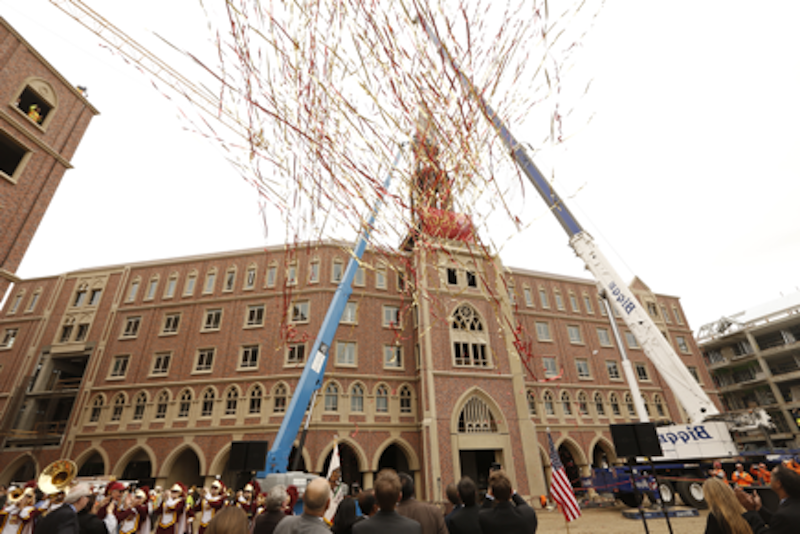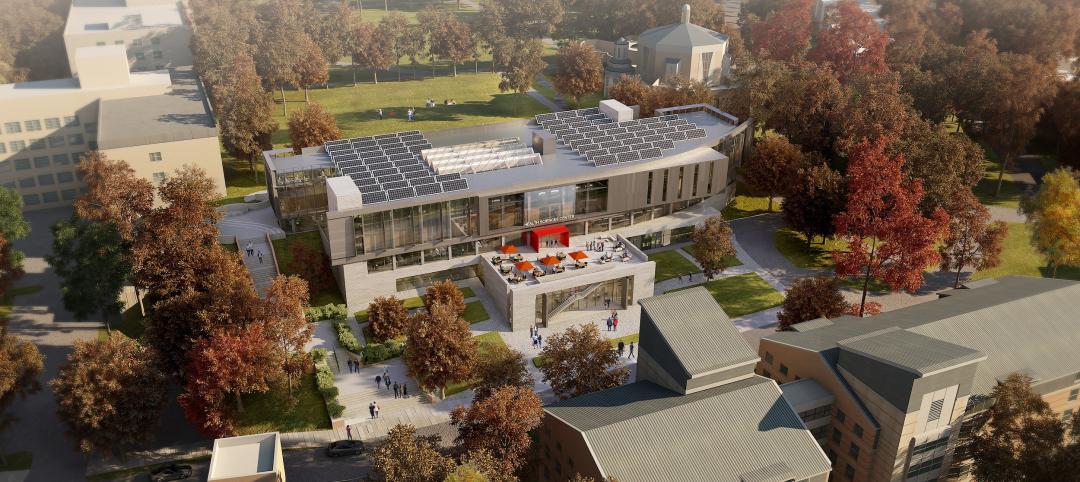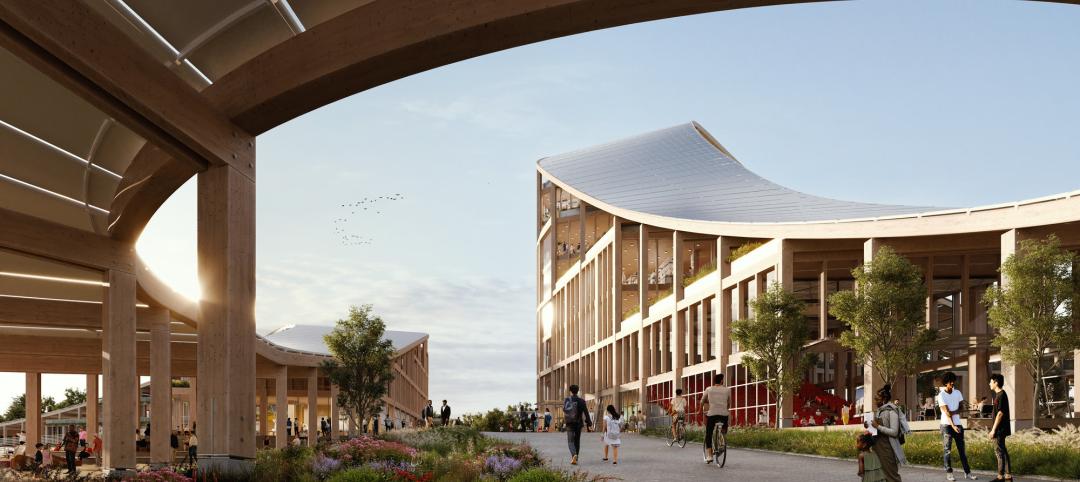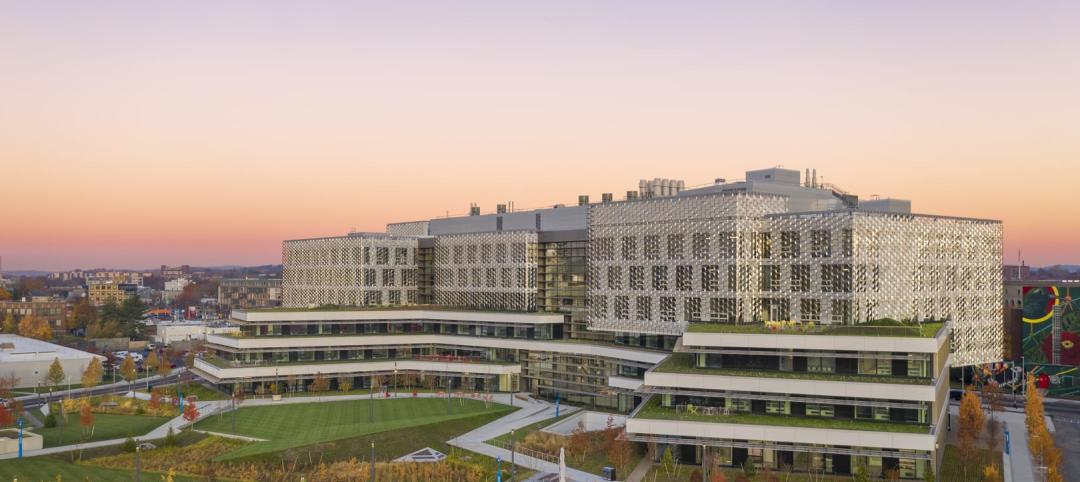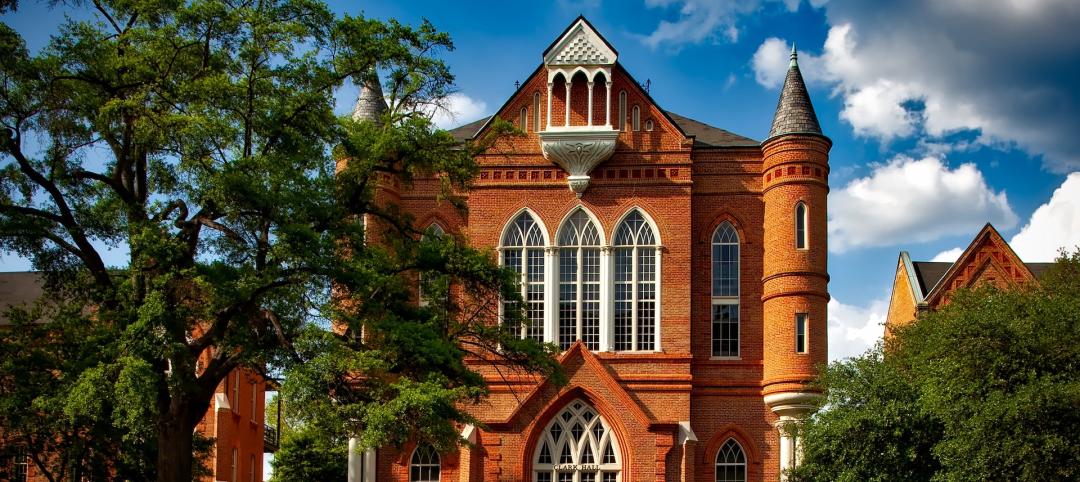This month, work crews began moving furniture, fixtures and equipment into USC Village, the biggest development project in the history of South Los Angeles, which is on schedule to be ready for the fall semester at the University of Southern California’s University Park campus.
The $700 million, 15-acre USC Village, which has been in the works since 2005, will consist of six buildings with a total of 1.25 million sf of space and 2,700 student beds. There will be eight residential colleges within USC Village, four of which had been endowed at presstime.
To view a flyover of the Village’s construction site, click here.
When USC Village was conceived, it was one of the first mixed-use residential college projects in the nation, and when completed it will include 100,000 sf of retail space for 30 tenants such as Bank of America, Starbucks, Target, and Trader Joe’s (which will be welcomed in South L.A. a food desert when it comes to supermarkets).
The Village will also have food and beverage outlets, and a 30,000-sf fitness center. The Village will provide 1,200 covered bike-parking slots, and another 500 slots for day-to-day bike parking by patrons of the gym or retail stores.
The exterior design of USC Village is best described as “collegiate gothic,” and reflects the mandate by USC’s president C.L. Max Nikias that the look of the Village be connected to the rest of the campus. “We could introduce any design feature, as long as it was gothic,” says Daniel Benjamin, AIA, LEED AP BD+C, Principal and Design Leader for Harley Ellis Devereaux, USC Village’s architect.
That meant a lot of detailing at the ground plane and roof level, but more traditional brick façade in the middle.
Benjamin notes that there weren’t enough masons in southern California to handle of project of this magnitude. So instead of importing workers from other parts of the state, the Building Team—which includes Hathaway Dinwiddie as the GC—decided to precast the concrete facades off site, typically delivered in 12- by 20-ft modules. Brick trimmed with sandblasted warm-colored concrete surrounds gives the buildings a three-dimensional sense of detail.
Prefabrication also cut the construction process, which began in June 2014, by nearly a year. These buildings are designed to last 80-100 years.
During the approval process, three major changes were made to USC Village’s plan, recalls Willy Marsh, USC’s director of construction. A large parking garage with a field on its roof became underground parking. High-rise residential towers became low-rise buildings. And a much larger retail center was de-emphasized. “The decision was made that retail wasn’t going to drive this project,” says Marsh.
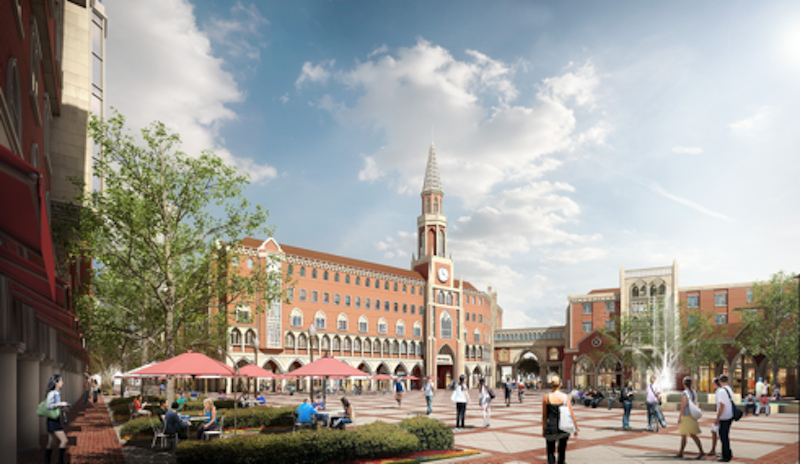
The buildings' facade consists of precast concrete and brickface that mimics older buildings on campus. Image: USC
USC Village comprises about 20% of the University Park campus, and Nikias, says Benjamin, wanted the connections to be seamless. So the Village’s pathways and streets flow seamlessly into the larger campus’s circulation routes. More than 200 trees will be planted within and around the Village.
This campus is an integral part of the surrounding community. As part of this project, USC is providing $40 million in community benefits, including a $20 million contribution to an affordable housing fund that is managed by the city.
The number of student beds could increase to 5,000 if USC decides to redevelop a 12-acre lot adjacent to USC Village. Marsh says that project could be a decade away.
Related Stories
University Buildings | May 5, 2023
New health sciences center at St. John’s University will feature geothermal heating, cooling
The recently topped off St. Vincent Health Sciences Center at St. John’s University in New York City will feature impressive green features including geothermal heating and cooling along with an array of rooftop solar panels. The geothermal field consists of 66 wells drilled 499 feet below ground which will help to heat and cool the 70,000 sf structure.
Mass Timber | May 1, 2023
SOM designs mass timber climate solutions center on Governors Island, anchored by Stony Brook University
Governors Island in New York Harbor will be home to a new climate-solutions center called The New York Climate Exchange. Designed by Skidmore, Owings & Merrill (SOM), The Exchange will develop and deploy solutions to the global climate crisis while also acting as a regional hub for the green economy. New York’s Stony Brook University will serve as the center’s anchor institution.
University Buildings | Apr 24, 2023
Solving complicated research questions in interdisciplinary facilities
University and life science project owners should consider the value of more collaborative building methods, close collaboration with end users, and the benefits of partners who can leverage sector-specific knowledge to their advantage.
Green | Apr 21, 2023
Top 10 green building projects for 2023
The Harvard University Science and Engineering Complex in Boston and the Westwood Hills Nature Center in St. Louis are among the AIA COTE Top Ten Awards honorees for 2023.
Higher Education | Apr 13, 2023
Higher education construction costs for 2023
Fresh data from Gordian breaks down the average cost per square foot for a two-story college classroom building across 10 U.S. cities.
Market Data | Apr 11, 2023
Construction crane count reaches all-time high in Q1 2023
Toronto, Seattle, Los Angeles, and Denver top the list of U.S/Canadian cities with the greatest number of fixed cranes on construction sites, according to Rider Levett Bucknall's RLB Crane Index for North America for Q1 2023.
University Buildings | Apr 11, 2023
Supersizing higher education: Tracking the rise of mega buildings on university campuses
Mega buildings on higher education campuses aren’t unusual. But what has been different lately is the sheer number of supersized projects that have been in the works over the last 12–15 months.
Contractors | Apr 10, 2023
What makes prefabrication work? Factors every construction project should consider
There are many factors requiring careful consideration when determining whether a project is a good fit for prefabrication. JE Dunn’s Brian Burkett breaks down the most important considerations.
Smart Buildings | Apr 7, 2023
Carnegie Mellon University's research on advanced building sensors provokes heated controversy
A research project to test next-generation building sensors at Carnegie Mellon University provoked intense debate over the privacy implications of widespread deployment of the devices in a new 90,000-sf building. The light-switch-size devices, capable of measuring 12 types of data including motion and sound, were mounted in more than 300 locations throughout the building.
Architects | Apr 6, 2023
New tool from Perkins&Will will make public health data more accessible to designers and architects
Called PRECEDE, the dashboard is an open-source tool developed by Perkins&Will that draws on federal data to identify and assess community health priorities within the U.S. by location. The firm was recently awarded a $30,000 ASID Foundation Grant to enhance the tool.


